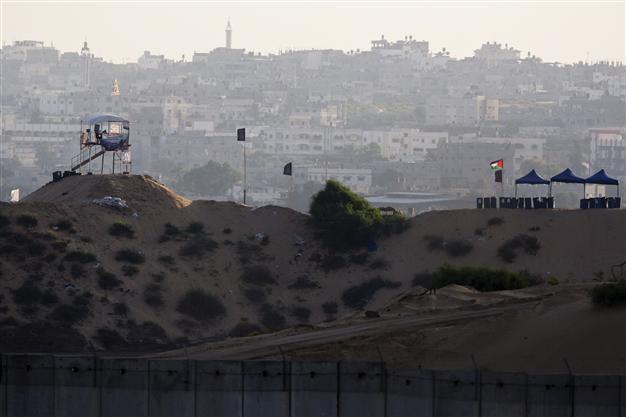Israel, Palestinians mark one year since Gaza war
GAZA CITY, Palestinian Territories - Agence France-Presse

REUTERS photo
Israel and Palestinians mark one year since last summer's devastating war in the Gaza Strip on July 8, with a ceasefire still largely holding but few of the issues that led to the conflict resolved.
The war took a heavy toll on Gaza, killing 2,251 Palestinians, including more than 500 children. Seventy-three people were killed on the Israeli side, including 67 soldiers.
A UN report released last month said both sides may have committed war crimes during the 50-day conflict, which has left more than 100,000 Gazans homeless in the impoverished enclave of 1.8 million people.
It was the third war in Gaza in six years, and by far the deadliest and most destructive of the three, leaving families wondering when the suffering will end.
"You have to remember, if you are even just a seven-year-old child... you have been through three wars," said Robert Turner, Gaza operations director for UN relief agency UNRWA.
Hamas, the Islamist movement that runs the Gaza Strip, has planned commemorations on July 8.
Israel held a memorial on July 6 for its 73 victims killed in the war, where Prime Minister Benjamin Netanyahu defended the military offensive.
"I say to all enemies of Israel -- Hamas, Hezbollah, Iran and ISIL (Islamic State of Iraq and the Levant) -- that those who attempt to attack our people will pay with their blood," he said.
The circumstances surrounding Gaza have led to fears that another war could eventually break out, with rockets still occasionally fired into Israel and the Jewish state responding with air strikes.
Indirect talks on shoring up the ceasefire that ended last year's war and easing Israel's strict blockade on the territory have taken place, but there have been no signs that a deal could be reached anytime soon.
The blockade, as well as a lack of financing from international donors, have been blamed for the slow pace of reconstruction in Gaza, where around 18,000 homes were destroyed or severely damaged.
A split between Hamas and the Palestinian Authority led by president Mahmud Abbas, which runs the Israeli occupied West Bank, has worsened the situation. Reconciliation attempts have failed to heal the rift.
Meanwhile, Hamas has been challenged by Salafist extremists in Gaza claiming links to the ISIL jihadist group and who have taken credit for recent rocket fire.
Last year's war was sparked in part by the abduction and murder of three young Israelis near a Jewish settlement in the West Bank.
The kidnapping triggered a massive manhunt in which hundreds of Palestinians were arrested and at least five killed.
It also led to the grisly revenge slaying of a 16-year-old Palestinian, who was snatched in east Jerusalem and burned alive by Israelis.
A surge in rocket fire from Gaza into Israel followed, and Israel in response launched its offensive on July 8, giving it the name "Operation Protective Edge". A ground offensive began on July 17.
Air and naval bombardments on the coastal strip continued until an Egyptian-brokered truce was reached in Cairo on August 26.
Israel's aims in the war were to stop the rocket fire and destroy tunnels used by Palestinian militants to carry out attacks.
But rocket fire has started up again -- although sporadically and not claimed by Hamas -- and militants in Gaza have rebuilt tunnels.
Hamas claimed victory after the war, but that has been scoffed at by Gazans who have seen family members killed and who now live among the ruins of their former homes.
Mohammed Zaza, a 19-year-old nursing student, pointed to a vacant lot where his family's house once stood and said they now live in an overpriced, rented flat.
"All that comes out of our pocket because we are receiving absolutely no help," he said.
Instead of houses, frustration has built in Gaza, where 39 percent of the population lives below the poverty line.
"If we don't address the underlying causes of these ongoing conflicts, we're simply resetting the clock for the next cycle of violence," said the UN's Turner.
